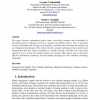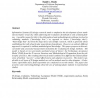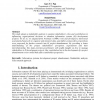ECIS
2003
14 years 1 months ago
2003
This paper discusses information quality issues concerning consumer data assimilated by telecommunication companies (telcos) in regional and global ventures. First, it describes v...
ECIS
2003
14 years 1 months ago
2003
The paper argues for the use of discourse analysis in information systems research by drawing on a discourse analysis study of virtual organizing. It identifies a range of issues ...
ECIS
2003
14 years 1 months ago
2003
The Application Service Provider (ASP) is a pivotal point in the organization of information systems, since it brings up a new paradigm: “make, buy or rent”. An ASP is a compa...
ECIS
2003
14 years 1 months ago
2003
Currently, there is no standard instrument for evaluating learning effectiveness. While final examinations and end-of-semester course evaluation surveys can be used to do this, th...
ECIS
2003
14 years 1 months ago
2003
Information Systems (IS) design research tends to emphasise the development of new methods (normative research), while addressing the evaluation of methods in only a limited fashi...
ECIS
2003
14 years 1 months ago
2003
This study adopts a stakeholder analysis to examine stakeholders’ roles and contributions in influencing organizational decisions to abandon information systems (IS) development...
ECIS
2003
14 years 1 months ago
2003
Theories of inter-organisational co-ordination propose that information processing capabilities (structure, process and technology) must be aligned with information processing nee...
ECIS
2003
14 years 1 months ago
2003
Most published research in information systems is underpinned by a positivist or empiricist philosophy. This generally involves the collection of quantitative data and its subsequ...
ECIS
2003
14 years 1 months ago
2003
This paper argues that ERP systems take the part of an organization’s administrative paradox. An administrative paradox is two sides of the same coin when coordinating organizat...
ECIS
2003
14 years 1 months ago
2003
The European Union(EU) Data Protection (Privacy) Directive of 1995 (EUPD) and resulting legislation introduced by member states is designed to ensure that business activity is sub...



